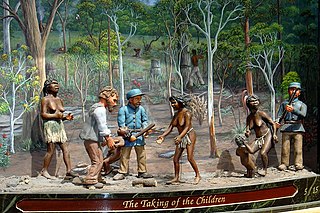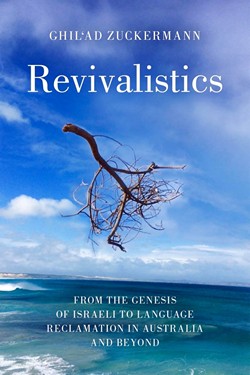Related Research Articles

The Stolen Generations were the children of Australian Aboriginal and Torres Strait Islander descent who were removed from their families by the Australian federal and state government agencies and church missions, under acts of their respective parliaments. The removals of those referred to as "half-caste" children were conducted in the period between approximately 1905 and 1967, although in some places mixed-race children were still being taken into the 1970s.

The Indigenous languages of Australia number in the hundreds, the precise number being quite uncertain, although there is a range of estimates from a minimum of around 250 up to possibly 363. The Indigenous languages of Australia comprise numerous language families and isolates, perhaps as many as 13, spoken by the Indigenous peoples of mainland Australia and a few nearby islands. The relationships between the language families are not clear at present although there are proposals to link some into larger groupings. Despite this uncertainty, the Indigenous Australian languages are collectively covered by the technical term "Australian languages", or the "Australian family".
Language policy is both an interdisciplinary academic field and implementation of ideas about language use. Some scholars such as Joshua Fishman and Ofelia García consider it as part of sociolinguistics. On the other hand, other scholars such as Bernard Spolsky, Robert B. Kaplan and Joseph Lo Bianco argue that language policy is a branch of applied linguistics.

Port Augusta is a small coastal city in South Australia about 310 kilometres (190 mi) by road from the state capital, Adelaide. Most of the city is on the eastern shores of Spencer Gulf, immediately south of the gulf's head, comprising the city's centre and surrounding suburbs, Stirling North, and seaside homes at Commissariat Point, Blanche Harbor and Miranda. The suburb of Port Augusta West is on the western side of the gulf on the Eyre Peninsula. Together, these localities had a population of 13,515 people in the 2021 census.

The word mamihlapinatapai is derived from the Yaghan language of Tierra del Fuego, listed in The Guinness Book of World Records as the "most succinct word", and is considered one of the hardest words to translate. It has been translated as "a look that without words is shared by two people who want to initiate something, but that neither will start" or "looking at each other hoping that the other will offer to do something which both parties desire but are unwilling to do".
Language revitalization, also referred to as language revival or reversing language shift, is an attempt to halt or reverse the decline of a language or to revive an extinct one. Those involved can include linguists, cultural or community groups, or governments. Some argue for a distinction between language revival and language revitalization. There has only been one successful instance of a complete language revival, the Hebrew language, creating a new generation of native speakers without any pre-existing native speakers as a model.

In linguistics, language death occurs when a language loses its last native speaker. By extension, language extinction is when the language is no longer known, including by second-language speakers, when it becomes known as an extinct language. A related term is linguicide, the death of a language from natural or political causes, and, rarely, glottophagy, the absorption or replacement of a minor language by a major language.
Ngarrindjeri, also written Narrinyeri, Ngarinyeri and other variants, is the language of the Ngarrindjeri and related peoples of southern South Australia. Five dialects have been distinguished by a 2002 study: Warki, Tanganekald, Ramindjeri, Portaulun and Yaraldi.

The Barngarla, formerly known as Parnkalla and also known as Pangkala, are an Indigenous people of South Australia and the traditional owners of much of Eyre Peninsula. Their language, Barngarla is a Yura language and part of a revival effort by the University of Adelaide.

The Battalion of the Defenders of the Language was a small but militant body established by Jewish students at the Herzliya Hebrew Gymnasium in Tel Aviv in the 1920s to urge Jews in then Mandatory Palestine to use only the Hebrew language.

Ghil'ad Zuckermann is an Israeli-born language revivalist and linguist who works in contact linguistics, lexicology and the study of language, culture and identity.

Barngarla, formerly known as Parnkalla, is an Aboriginal language of Eyre Peninsula, South Australia. It was formerly extinct, but has undergone a process of revival since 2012.

Boaz Keysar is the Chair of the Cognition Program at the University of Chicago, and broadly researches communication, negotiation, and decision making.

Language Contact and Lexical Enrichment in Israeli Hebrew is a scholarly book written in the English language by linguist Ghil'ad Zuckermann, published in 2003 by Palgrave Macmillan. The book proposes a socio-philological framework for the analysis of "camouflaged borrowing" such as phono-semantic matching. It introduces for the first time a classification for "multisourced neologisms", new words that are based on two or more sources at the same time.
The Adelaide Language Festival is a language festival that celebrates linguistic diversity and encourages people to learn about the cognitive and cultural advantages of multilingualism. It consists of keynote presentations, musical performances, Welcome to Country by a local Aboriginal Australian, and intensive sessions in dozens of languages.

The Nauo people, also spelt Nawu and Nhawu, are an Aboriginal Australian people of the south-western Eyre Peninsula in South Australia. The Nauo language became extinct by the twentieth century, but efforts are being made to revive it.
Clamor Wilhelm Schürmann was a Lutheran missionary who emigrated to Australia and did fundamental pioneering work, together with his colleague Christian Gottlieb Teichelmann, on recording some Australian languages in South Australia.
In linguistics, polarity of gender is when a lexical item takes the opposite grammatical gender than expected. The phenomenon is widespread in Afroasiatic languages such as Semitic and Cushitic tongues. For example, in Somali, which is a Cushitic language, plural nouns usually take the opposite gender of their singular forms.

Revivalistics: From the Genesis of Israeli to Language Reclamation in Australia and Beyond is a scholarly book written by linguist and revivalist Ghil'ad Zuckermann. It was published in 2020 by Oxford University Press. The book introduces revivalistics, a trans-disciplinary field of enquiry exploring "the dynamics and problematics inherent in spoken language reclamation, revitalization, and reinvigoration".
References
- 1 2 Dr Anna Goldsworthy on the Barngarla language reclamation, The Monthly, September 2014
- ↑ Why we should revive dead languages, by Ghil‘ad Zuckermann, OUPBlog, June 20, 2020.
- ↑ Indigenous meanings of Australian town names, Sophie Verass, NITV, August 11, 2016.
- ↑ One Israeli's Mission to Revive Aboriginal Language Down Under, Haaretz, March 20, 2016.
- 1 2 Zuckermann, Ghil'ad (2020). Revivalistics: From the Genesis of Israeli to Language Reclamation in Australia and Beyond . New York: Oxford University Press. ISBN 9780199812790. ISBN 9780199812776
- ↑ "Book Review, The Australian Journal of Anthropology / Timothy Haines". 11 July 2020. doi:10.1111/taja.12354. S2CID 225550368.
{{cite journal}}: Cite journal requires|journal=(help)